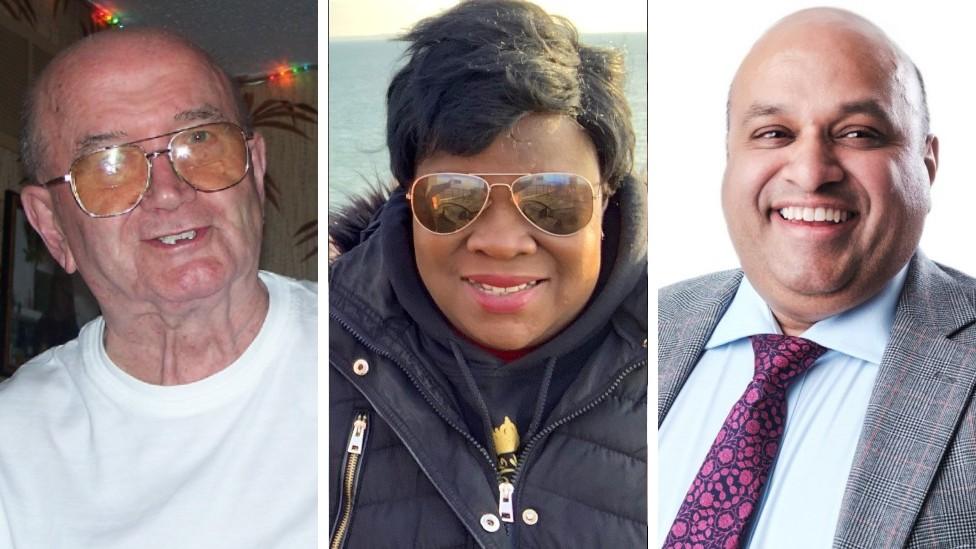Cherry Wilson: Should I remove or reply to my racist Facebook friend?
- Published
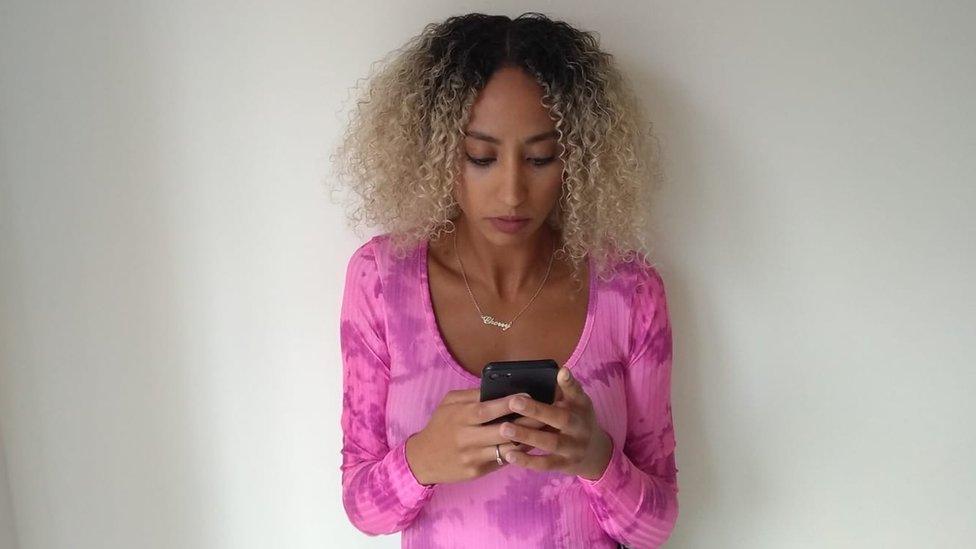
Do I delete a friend or reply to their posts?
We probably all have that one friend on Facebook - who has exposed themselves recently as being racist.
Mine is someone who I know from where I grew up.
Normally I scroll past their statuses, slagging off their ex or their results from a Facebook quiz.
But with the focus on George Floyd's death, anti-racism protests and the debate about removing controversial British statues, they've moved to posting casually racist stuff.
I know they don't think it's a big deal - it's just banter, don't take it too seriously.
But when I see stuff like that, it stings.
It just reminds me of all the racist names I've been called, all the times I've been asked, "Where are you from?" (England)
"No where are you from, from?" (Oh you mean why do I have this colour skin?)
It reminds me of the time my sister and I couldn't get into a London club because they wanted a "European crowd" (code for white), and of all the times people think it's okay to touch my curly hair (I'm not a pet).
Racism is more than just calling someone the "N-word".
I don't know if I have the energy to respond to this person's posts, but if I don't speak up, am I just letting them off the hook?

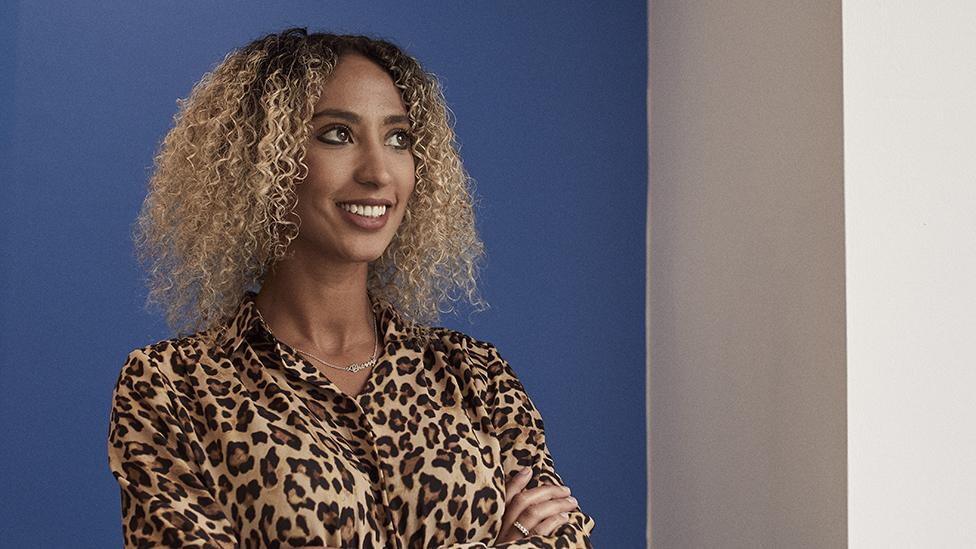
Cherry Wilson is a proud northerner who recently moved back to Stockport, Greater Manchester, where she grew up.
She studied journalism in Sheffield and was the first in her family to go to university.
Her passion is telling the stories of the people and communities behind the headlines, exploring issues that matter to them.
She has a great love for cups of tea, jerk chicken, chips and gravy and Coronation Street.
More from Cherry

I decided I should do something. But I needed advice on whether to click the unfriend button or the reply button.
Social psychologist Dr Keon West says it depends on what you're trying to achieve.
"If you're trying to just safeguard your mental health, I would not say you need to approach that person.
"I don't think you'll feel very good after repeatedly engaging with people doing very racist things, you will probably feel worse."
But if you're hoping to make them post things that are less racist or be more compassionate, you might consider hitting that reply button.
"If you are trying to remind other people that social norms do not permit this kind of behaviour then I would say you should address that person and have a conversation with them.
"Even if it doesn't change their mind, it might give them a different sense of what's considered acceptable behaviour."
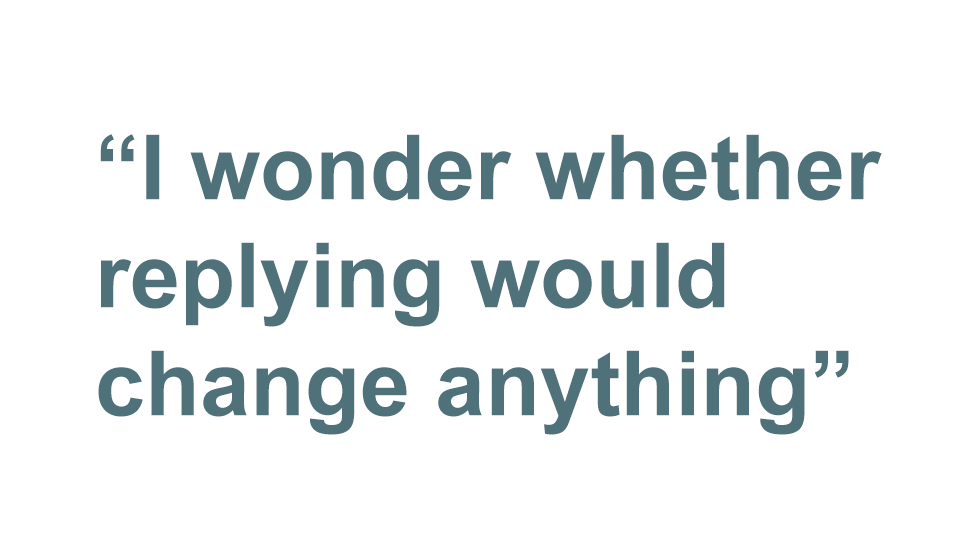
When I see the posts from the person I know, I wonder whether replying to them would change anything.
I can just hear them now - "You're just playing the race card."
So I've asked other people what they've done when they've come across racist and ignorant posts.
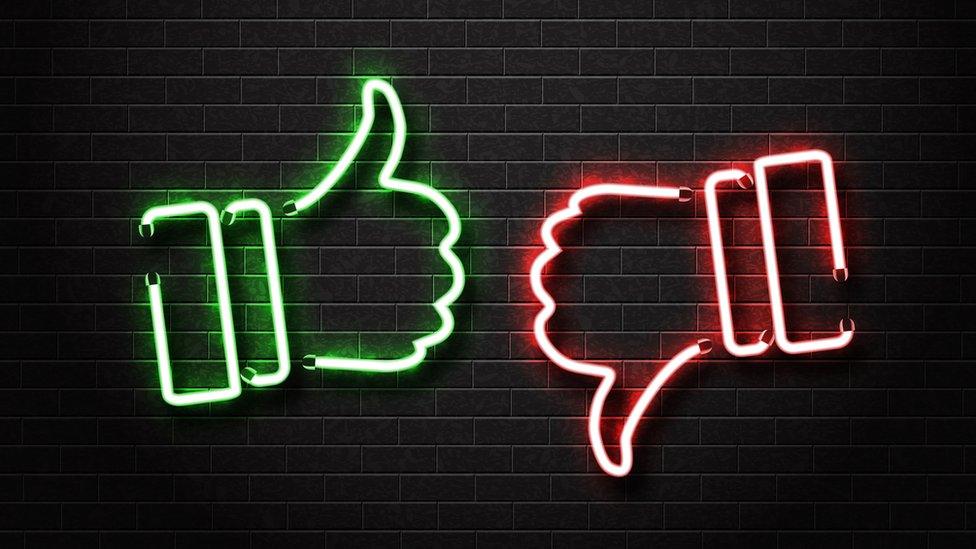
"I definitely started to reply to comments, but it got bad," Alisha Standing, 27, told me.
"Someone told me I deserve to get raped while I was trying to explain why it's important that Black Lives Matter has its own voice vs All Lives Matter.
"After that, I just decided to delete and block people. It actually scarred me a bit, to be honest."
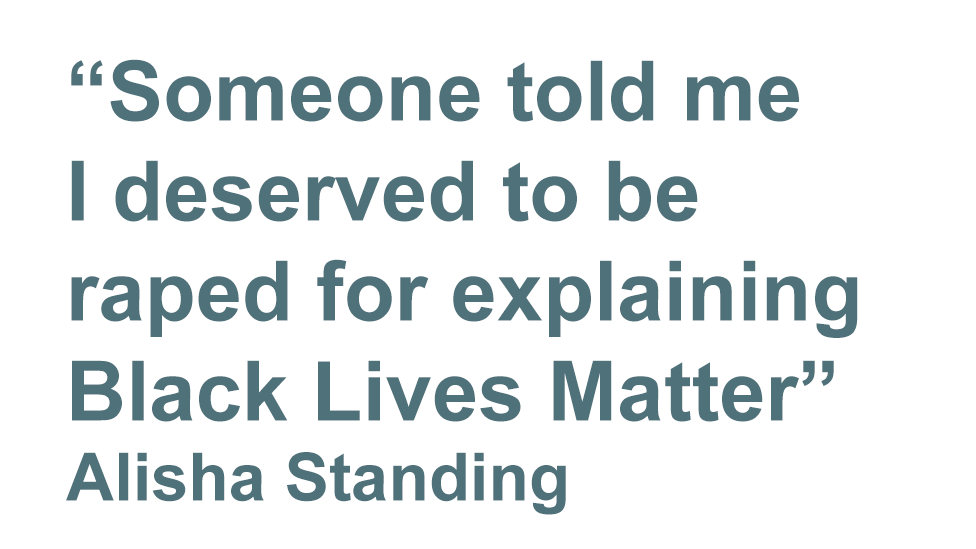
Comedian and author Njambi McGrath took the time to reply to a man she considered racist even though it can sometimes feel "exhausting".
But she believes by sharing her thoughts it might make him think about how other people feel.
"If he goes home that day and even if he's going to hold the same view, at the back of his mind he will know someone has raised a point.
"He is not as ignorant as he was before I engaged with him."
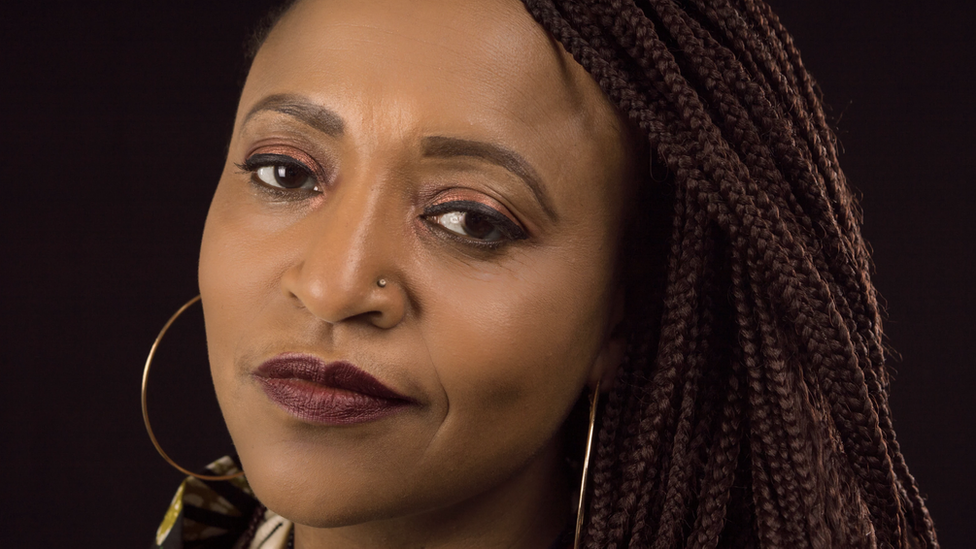
Njambi says she sends informative articles to people who are posting racist views on social media
Kasia Williams says her husband has experienced racism, so she feels it's important for her to speak out when she sees it on Facebook.
"I can't stay silent and ignore that. A lot of people did listen and said, 'Thanks for sharing your knowledge' and went on to educate others and I think that's important.
"But unfortunately there are some people who don't want to listen and I started to feel like it was a waste of time."
Dr West says if you reply to people's posts, don't expect them to suddenly stop being racist.
"If you think that by arguing with them on the internet they will be less biased, the research says probably not. But they may be aware that other people do not appreciate their behaviour.
"There are ways to educate people but they still take time and usually don't take the format of a shouting match on the internet."
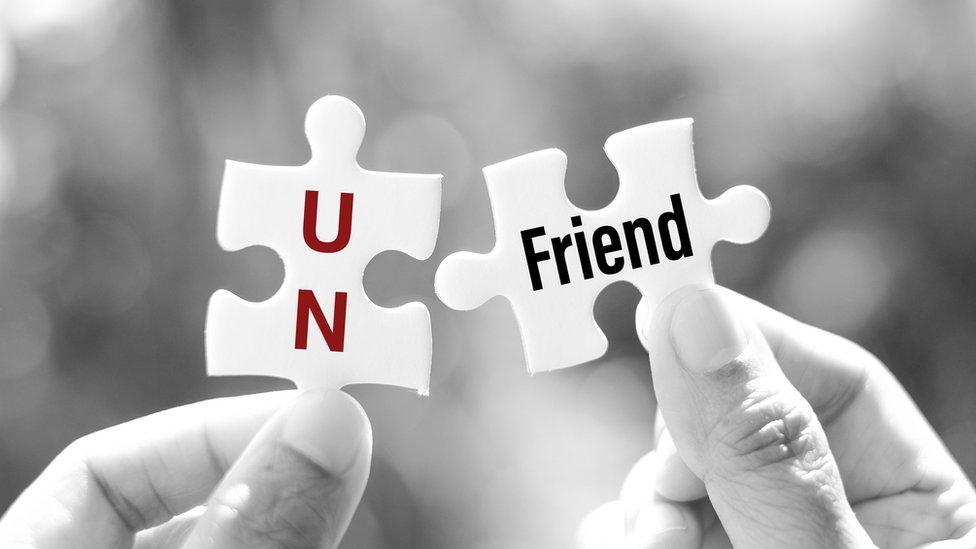
Matthew Collins, head of intelligence at anti-racism charity Hope Not Hate, says a lot of racism and bigotry comes from fear and a lack of understanding.
He calls it the "what-about-ery" - meaning "what about me?"
"They look at Black Lives Matter, and the two things that they say is, 'Why should they get something I don't have?' and that they don't understand the concept.
"They have a real fear that what little they have, they have something to lose by it."
Matthew believes society is going to need strong leadership to address the issue of some people's fears around racial equality in order to make significant progress.
"We have to bear in mind we're going to come up against a lot of resistance unless we can soothe the fears of people who think equality for people of colour somehow takes something away from them - and of course it doesn't."
Having looked again at the Facebook page of the person I know, one of their latest posts mocks black men.
I can't help but roll my eyes - I'm tired of it all. Time to click that unfriend button.
Follow Cherry on Twitter: @cherryewilson, external

Here is a selection of readers' experiences as told to us:
I posted a comment on Facebook which was clumsy - I suggested that all forms of oppression and barriers should be removed for all folks. I was using "all" in the sense that none should be left behind. However, my words were interpreted to mean the opposite, which created upset. So I would say this: engage with the individual. Don't dismiss them as stupid, ask them what they mean. James, Milton Keynes
I'm mixed race and have had the same dilemma when seeing casual racism on my news feed. Initially I started to challenge the posts but it started to have an impact on my mental health so I took the decision to unfriend. I'm grateful that I've had black and white friends check in on me during this time to make sure I'm OK. Michelle, Sheffield, UK
I am a white retired police officer. I would advise anyone to not share any racist articles with me and if they continued I would have to unfriend them. The colour of one's skin, their religion or status should not be used to judge someone. I choose my friends by how they treat others and what is in their heart. Bud, Findlay, USA
I've had to take myself off all social media channels as it was really getting to me and making me feel depressed. I am a white woman married to a Muslim man and we've laughed off instances that on reflection were clearly racist. When he offered to light a lady's cigarette at our local pub she said: "I thought you were going to stab me." Amy, St Helens, UK
My cousin has been posting anti-immigrant and propaganda for a long time and I always used to send articles debunking what she was writing and reporting her posts to Facebook. Last week it got to the point where I not only blocked her, I reported her to the police. Jonathan, UK
I am a white man, and I have no idea how to approach this issue. I've been told that replying is just being a "band-wagon liberal", a "libtard" and a "wannabe white-saviour". Conversely, I've been told that not replying, blocking, or unfriending is "white silence" or a lack of caring. It's easier to discuss it with people who agree. Maybe I'm a coward. I don't know the answer. Sam, Liverpool, UK
I was bought up in a mainly white racist area in the 80's and my own mum lied about my race, telling people I was white - it wasn't until recently she admitted I was mixed race. I put up with vile ignorant treatment all through school, and this was unpleasant and quite damaging. So now I press delete. It took up far too much of my time as a young girl and I don't want it to take up any more of my precious time. Gemma, Dudley,UK
I am white and married to a British black man. We have two young children. I have unfriended seven people this week because of the racially insensitive material they have been sharing ranging from "jokes" about monkeys being akin to protesters to more serious racist propaganda. Some of them are friends of old and some had become friends through business. I felt sad and disgusted. Emma, Alderley Edge, UK
I had an in-law on Facebook who repeatedly sent racist posts. In the end I defriended as it was a constant argument. Makes me sick to the stomach as I've known this person over 30 years. She thought because I'm white I'd agree with her views, at least now she knows that is definitely not the case. Lynn, Glasgow, UK
I have an older white South African friend who served in their army. I asked if he knew where "black face" had come from and why it was not acceptable, he had no clue. He is now reading and learning. I see a good positive change of attitude coming in the future. Abby, Sussex, UK
My friend shared a post that said: "Why are we demonstrating in England over a guy who died 1,000 miles away when no demonstration took place when white girls were raped in Rotherham?" I asked if anyone stopped people from demonstrating over the white girls. Also that the injustice of what happened to George Floyd has angered people of all races. I don't know if it will change him but at least he knows where I stand. Bim, Potter's Bar, UK
- Published14 May 2020
